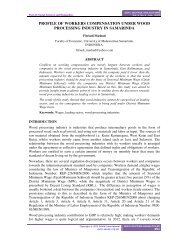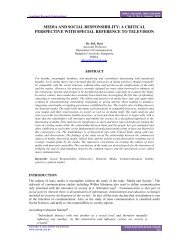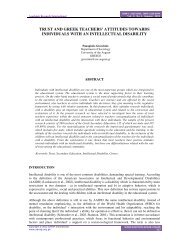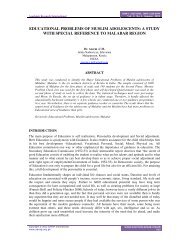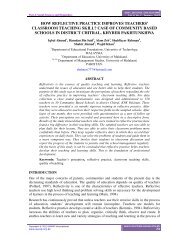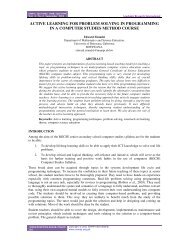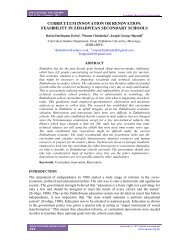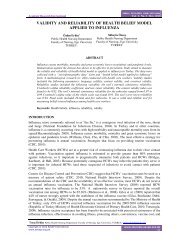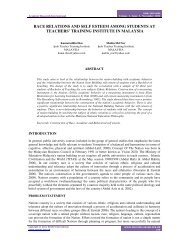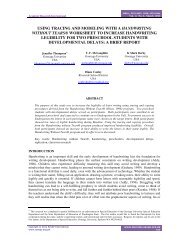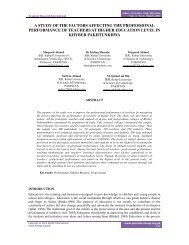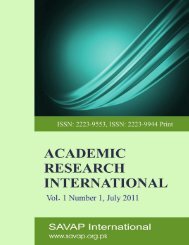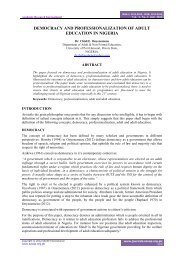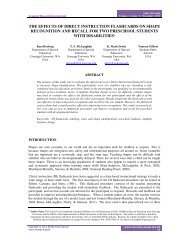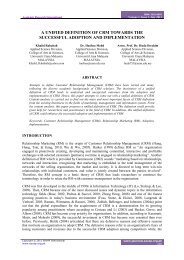- Page 3 and 4:
‘Research for Peace and Developme
- Page 5:
Academic Research International ISS
- Page 8 and 9:
Academic Research International ISS
- Page 10 and 11:
Academic Research International ISS
- Page 13 and 14:
Academic Research International ISS
- Page 15 and 16:
Academic Research International ISS
- Page 17 and 18:
Academic Research International ISS
- Page 19 and 20:
Academic Research International ISS
- Page 21 and 22:
Academic Research International ISS
- Page 23 and 24:
Academic Research International ISS
- Page 25 and 26:
Academic Research International ISS
- Page 27 and 28:
Academic Research International Mu
- Page 29 and 30:
Academic Research International Mu
- Page 31 and 32:
Academic Research International 1-
- Page 33 and 34:
Academic Research International 7-
- Page 35 and 36:
Academic Research International * 2
- Page 37 and 38:
Academic Research International 2-
- Page 39 and 40:
Academic Research International 1-
- Page 41 and 42:
Academic Research International 2-
- Page 43 and 44:
Academic Research International Mu
- Page 45 and 46:
Academic Research International 1.
- Page 47 and 48:
Academic Research International Mu
- Page 49 and 50:
Academic Research International ISS
- Page 51 and 52:
Academic Research International ISS
- Page 53 and 54:
Academic Research International ISS
- Page 55 and 56:
Academic Research International ISS
- Page 57 and 58:
Academic Research International ISS
- Page 59 and 60:
Academic Research International ISS
- Page 61 and 62:
Academic Research International ISS
- Page 63 and 64:
Academic Research International ISS
- Page 65 and 66:
Academic Research International ISS
- Page 67 and 68:
Academic Research International ISS
- Page 69 and 70:
Academic Research International ISS
- Page 71 and 72:
Academic Research International ISS
- Page 73 and 74:
Academic Research International ISS
- Page 75 and 76:
Academic Research International ISS
- Page 77 and 78:
Academic Research International ISS
- Page 79 and 80:
Academic Research International ISS
- Page 81 and 82:
Academic Research International ISS
- Page 83 and 84:
Academic Research International ISS
- Page 85 and 86:
Academic Research International ISS
- Page 87 and 88:
Academic Research International ISS
- Page 89 and 90:
Academic Research International ISS
- Page 91 and 92:
Academic Research International ISS
- Page 93 and 94:
Academic Research International ISS
- Page 95 and 96:
Academic Research International ISS
- Page 97 and 98:
Academic Research International ISS
- Page 99 and 100:
Academic Research International ISS
- Page 101 and 102:
Academic Research International ISS
- Page 103 and 104:
Academic Research International ISS
- Page 105 and 106:
Academic Research International ISS
- Page 107 and 108:
Academic Research International { l
- Page 109 and 110:
Academic Research International 2 b
- Page 111 and 112:
Academic Research International ISS
- Page 113 and 114:
Academic Research International ISS
- Page 115 and 116:
Academic Research International ISS
- Page 117 and 118:
Academic Research International ISS
- Page 119 and 120:
Academic Research International ISS
- Page 121 and 122:
Academic Research International ISS
- Page 123 and 124:
Academic Research International ISS
- Page 125 and 126:
Academic Research International ISS
- Page 127 and 128:
Academic Research International ISS
- Page 129 and 130:
Academic Research International 2.5
- Page 131 and 132:
Academic Research International ISS
- Page 133 and 134:
Academic Research International ISS
- Page 135 and 136:
Academic Research International ISS
- Page 137 and 138:
Academic Research International ISS
- Page 139 and 140:
Academic Research International ISS
- Page 141:
Academic Research International ISS
- Page 144 and 145:
Academic Research International ISS
- Page 146 and 147:
Academic Research International ISS
- Page 148 and 149:
Academic Research International ISS
- Page 150 and 151:
Academic Research International ISS
- Page 152 and 153:
Academic Research International ISS
- Page 154 and 155:
Academic Research International ISS
- Page 156 and 157:
Academic Research International ISS
- Page 158 and 159:
Academic Research International ISS
- Page 160 and 161:
Academic Research International ISS
- Page 162 and 163:
Academic Research International ISS
- Page 164 and 165:
Academic Research International ISS
- Page 166 and 167:
Academic Research International ISS
- Page 168 and 169:
Academic Research International ISS
- Page 170 and 171:
Academic Research International ISS
- Page 172 and 173: Academic Research International ISS
- Page 174 and 175: Academic Research International ISS
- Page 176 and 177: Academic Research International ISS
- Page 178 and 179: Academic Research International ISS
- Page 180 and 181: Academic Research International ISS
- Page 182 and 183: Academic Research International ISS
- Page 184 and 185: Academic Research International ISS
- Page 186 and 187: Academic Research International ISS
- Page 188 and 189: Academic Research International ISS
- Page 190 and 191: Academic Research International ISS
- Page 192 and 193: Academic Research International ISS
- Page 194 and 195: Academic Research International ISS
- Page 196 and 197: Academic Research International ISS
- Page 198 and 199: Academic Research International ISS
- Page 200 and 201: Academic Research International ISS
- Page 202 and 203: Academic Research International ISS
- Page 204 and 205: Academic Research International ISS
- Page 206 and 207: Academic Research International ISS
- Page 208 and 209: Academic Research International ISS
- Page 210 and 211: Academic Research International ISS
- Page 212 and 213: Academic Research International ISS
- Page 214 and 215: Academic Research International ISS
- Page 216 and 217: Academic Research International ISS
- Page 218 and 219: Academic Research International ISS
- Page 220 and 221: Academic Research International ISS
- Page 224 and 225: Academic Research International ISS
- Page 226 and 227: Academic Research International ISS
- Page 228 and 229: Academic Research International ISS
- Page 230 and 231: Academic Research International ISS
- Page 232 and 233: Academic Research International ISS
- Page 234 and 235: Academic Research International ISS
- Page 236 and 237: Academic Research International ISS
- Page 238 and 239: Academic Research International ISS
- Page 240 and 241: Academic Research International ISS
- Page 242 and 243: Academic Research International ISS
- Page 244 and 245: Academic Research International ISS
- Page 246 and 247: Academic Research International ISS
- Page 248 and 249: Academic Research International ISS
- Page 250 and 251: Academic Research International ISS
- Page 252 and 253: Academic Research International ISS
- Page 254 and 255: Academic Research International ISS
- Page 256 and 257: Academic Research International ISS
- Page 258 and 259: Academic Research International ISS
- Page 260 and 261: Academic Research International ISS
- Page 262 and 263: Academic Research International ISS
- Page 264 and 265: Academic Research International ISS
- Page 266 and 267: Academic Research International ISS
- Page 268 and 269: Academic Research International ISS
- Page 270 and 271: Academic Research International ISS
- Page 272 and 273:
Academic Research International ISS
- Page 274 and 275:
Academic Research International ISS
- Page 276 and 277:
Academic Research International ISS
- Page 278 and 279:
Academic Research International ISS
- Page 280 and 281:
Academic Research International ISS
- Page 282 and 283:
Academic Research International ISS
- Page 284 and 285:
Academic Research International ISS
- Page 286 and 287:
Academic Research International ISS
- Page 288 and 289:
Academic Research International ISS
- Page 290 and 291:
Academic Research International ISS
- Page 292 and 293:
Academic Research International ISS
- Page 294 and 295:
Academic Research International ISS
- Page 296 and 297:
Academic Research International ISS
- Page 298 and 299:
Academic Research International ISS
- Page 300 and 301:
Academic Research International ISS
- Page 302 and 303:
Academic Research International ISS
- Page 304 and 305:
Academic Research International ISS
- Page 306 and 307:
Academic Research International ISS
- Page 308 and 309:
Academic Research International ISS
- Page 310 and 311:
Academic Research International ISS
- Page 312 and 313:
Academic Research International ISS
- Page 314 and 315:
Academic Research International ISS
- Page 316 and 317:
Academic Research International ISS
- Page 318 and 319:
Academic Research International ISS
- Page 320 and 321:
Academic Research International ISS
- Page 322 and 323:
Academic Research International ISS
- Page 324 and 325:
Academic Research International ISS
- Page 326 and 327:
Academic Research International ISS
- Page 328 and 329:
Academic Research International ISS
- Page 330 and 331:
Academic Research International ISS
- Page 332 and 333:
Academic Research International ISS
- Page 334 and 335:
Academic Research International ISS
- Page 336 and 337:
Academic Research International ISS
- Page 338 and 339:
Academic Research International ISS
- Page 340 and 341:
Academic Research International ISS
- Page 342 and 343:
Academic Research International ISS
- Page 344 and 345:
Academic Research International ISS
- Page 346 and 347:
Academic Research International ISS
- Page 348 and 349:
Academic Research International ISS
- Page 350 and 351:
Academic Research International ISS
- Page 352 and 353:
Academic Research International ISS
- Page 354 and 355:
Academic Research International ISS
- Page 356 and 357:
Academic Research International ISS
- Page 358 and 359:
Academic Research International ISS
- Page 360 and 361:
Academic Research International ISS
- Page 362 and 363:
Academic Research International ISS
- Page 364 and 365:
Academic Research International ISS
- Page 366 and 367:
Academic Research International ISS
- Page 368 and 369:
Academic Research International ISS
- Page 370 and 371:
Academic Research International ISS
- Page 372 and 373:
Academic Research International ISS
- Page 374 and 375:
Academic Research International ISS
- Page 376 and 377:
Academic Research International ISS
- Page 378 and 379:
Academic Research International ISS
- Page 380 and 381:
Academic Research International ISS
- Page 382 and 383:
Academic Research International ISS
- Page 384 and 385:
Academic Research International ISS
- Page 386 and 387:
Academic Research International ISS
- Page 388 and 389:
Academic Research International ISS
- Page 390 and 391:
Academic Research International ISS
- Page 392 and 393:
Academic Research International ISS
- Page 394 and 395:
Academic Research International ISS
- Page 396 and 397:
Academic Research International ISS
- Page 398 and 399:
Academic Research International ISS
- Page 400 and 401:
Academic Research International ISS
- Page 402:
Academic Research International ISS
- Page 405 and 406:
Academic Research International ISS
- Page 407 and 408:
Academic Research International ISS



